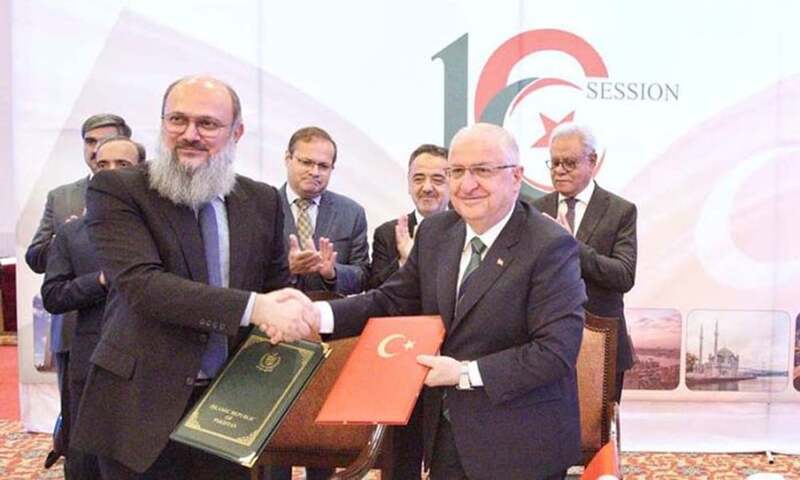ISLAMABAD: Pakistan and Türkiye on Tuesday signed a protocol aimed at enhancing bilateral cooperation across a wide range of sectors, including defence, during the Joint Ministerial Commission (JMC) meeting held in Islamabad.
The meeting was co-chaired by Pakistan’s Federal Minister for Commerce, Jam Kamal Khan, and Türkiye’s Minister of National Defence, Yaşar Güler.
Both sides underscored the importance of strengthening economic ties and pledged to give a new dimension to bilateral trade relations. It was decided that the Special Investment Facilitation Council (SIFC) would serve as a facilitator for Turkish investors, with Pakistan offering investment opportunities and facilities in Special Economic Zones.
$5bn Pakistan-Turkiye bilateral trade goal: PM urges MoC to set specific targets
An agreement was reached on undertaking joint projects in the areas of solar, wind, and hydropower.
Discussions also covered enhanced collaboration in oil and gas exploration, LNG trade, and emphasized partnerships in grid modernization and energy-efficiency initiatives.
The two countries agreed to encourage private sector investments and discussed joint bankable projects. Both sides also announced joint initiatives in defence production and technology transfer, while highlighting the need for joint training programs between the Pakistani and Turkish armed forces.
Speaking on the occasion, Commerce Minister Jam Kamal Khan praised Türkiye’s progress in defence technology, stating, “Türkiye’s advancement in defence technology is commendable.” There was mutual agreement on cooperation in the agriculture sector, with a focus on seed technology, food processing, and livestock development. Proposals for collaboration in pharmaceuticals, biotechnology, and medical devices were also discussed.
Pakistan’s Commerce Minister noted that the “Heal in Türkiye” initiative could serve as a new bridge for promoting health tourism between the two nations.
In the realm of education and research, both sides declared these as priority areas and acknowledged the importance of Türkiye’s scholarship programs for Pakistani students.
A major highlight of the meeting was the agreement to establish the Pakistan-Türkiye Textile Technology Center in Faisalabad. Both countries also agreed to deepen cooperation in Information Technology and the digital economy, including e-commerce, fintech, artificial intelligence, and cybersecurity.
Further, the two sides discussed partnerships in transport, logistics, and maritime connectivity, and agreed to expand their aviation cooperation. A proposal to facilitate the skilled Pakistani workforce in Türkiye was also taken under consideration.
The meeting concluded with a reaffirmation of both countries’ strong support for the Palestinian people’s struggle for freedom.
In his address, Minister Jam Kamal Khan emphasized that the newly signed protocol represents a roadmap for transforming the historic bonds between Pakistan and Türkiye into tangible economic outcomes.
He noted that despite being natural trade and investment partners, the current volume of bilateral trade falls short of the potential. Special emphasis, he said, has been placed on accelerating the implementation of the Pakistan-Türkiye Trade in Goods Agreement.
He reiterated Pakistan’s commitment—through the SIFC—to providing comprehensive support to Turkish investors in Special Economic Zones and priority sectors. “Together, we can unlock new avenues of trade, investment, and industrial collaboration,” he said.
Minister Kamal also highlighted the immense potential for cooperation in the energy, oil, and gas sectors, adding that defence collaboration has long been a cornerstone of Pakistan-Türkiye relations. He stressed the importance of co-production, technology transfer, and capacity-building initiatives.
He further pointed to opportunities for value addition in food processing, livestock management, and fisheries, which would not only enhance trade but also ensure affordable food supplies.
Concluding his remarks, the Minister stated that both sides have agreed to strengthen cooperation in labour mobility, media, culture, and tourism.
Copyright Business Recorder, 2025
